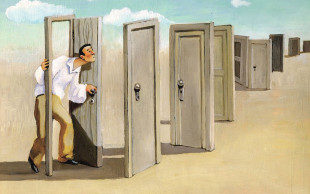Dr Susan Weinschenk, a behavioral psychologist and founder of The Team W shares with us the science of why new year's resolution don't work.
How many New Year's resolutions have you made in your life? How many have you successfully accomplished? The estimate is that less than 10% of New Year's resolutions are actually achieved (University of Scranton Psychology Professor John C. Norcross, Ph.D.). There's a lot of homespun folksy advice out there this time of year about how to make sure you reach your New Year's goals, but I thought I'd share the actual science of how to change behaviour.
There's two main lines of brain and behaviour science that influence New Year's resolutions: The science of habits and the science of self-stories.
Let's start with the science of habits.
A lot of New Year's resolutions have to do with making new habits or changing existing ones. If your resolutions are around things like eating healthier, exercising more, drinkingless, quitting smoking, texting less, spending more time "unplugged" or any number of other "automatic" behaviours then we are talking about changing existing habits or making new habits. Habits are automatic, "conditioned" responses. You get up in the morning and stop at Starbucks for a pastry and a latte. You go home at the end of work and plop down in front of the TV. Here's what you need to know about the science of changing existing habits or making new ones:
-
Contrary to popular opinion, it's not hard to change habits IF you do so based on science.
-
To change a new habit you essentially have to create a new one, so whether you are changing an existing habit or creating a new one, the "scientific" method for doing so is the same.
-
You have already created literally HUNDREDS of habits that you have now, and you don't even remember how they got started, so creating habits can't be that hard or you wouldn't have so many of them!
To create a new habit you have to follow these three steps (based on B.J. Fogg and Charles Duhigg)
1) You MUST pick a small action.
"Get more exercise" is not small. "Eat healthier" is not small. This is a big reason why New Year's resolutions don't work. If it's a habit and you want a new one it MUST be something really small. For example, instead of "Get more exercise" choose "Walk 1/3 more than I usually do" or "Take the stairs each morning to get to my office, not the elevator", or "Have a smoothie every morning with kale in it". These are relatively small actions.
2) You MUST attach the new action to a previous habit.
Figure out a habit you already have that is well established, for example, if you already go for a brisk walk 3 times a week, then adding on 10 more minutes to the existing walk connects the new habit to an existing one. The existing habit "Go for walk" now becomes the "cue" for the new habit: "Walk 10 more minutes." Your new "stimulus-response" is Go For Walk (Stimulus) followed by "Add 10 minutes." Your existing habit of "walk through door at office" can now become the "cue" or stimulus for the new habit of "walk up a flight of stairs." Your existing habit of "Walk into the kitchen in the morning" can now be the stimulus for the new habit of "Make a kale smoothie."
3) You MUST make the new action EASY to do for at least the first week.
Because you are trying to establish a conditioned response, you need to practice the new habit from the existing stimulus from 3 to 7 times before it will "stick" on its own. To help you through this 3 to 7 times phase make it as EASY as possible. Write a note and stick it in your walking shoe that says "Total time today for walk is 30 minutes". Write a note and put it where you put your keys that says: "Today use the stairs." Put the kale in the blender and have all your smoothie ingredients ready to go in one spot in the refrigerator.
If you take these three steps and you practice them 3 to 7 days in a row your new habit will be established.
Now let's tackle the science of self-stories.
The best (and some would say the only) way to get a large and long-term behaviour change, is by changing your self-story.
Everyone has stories about themselves that drive their behaviour. You have an idea of who you are and what’s important to you. Essentially you have a "story" operating about yourself at all times. These self-stories have a powerful influence on decisions and actions.
Whether you realize it or not, you make decisions based on staying true to your self-stories. Most of this decision-making based on self-stories happens unconsciously. You strive to be consistent. You want to make decisions that match your idea of who you are. When you make a decision or act in a way that fits your self-story, the decision or action will feel right. When you make a decision or act in a way that doesn’t fit your self-story you feel uncomfortable.
If you want to change your behaviour and make the change stick, then you need to first change the underlying self-story that is operating. Do you want to be more optimistic? Then you'd better have an operating self-story that says you are an optimistic person. Want to join your local community band? Then you'll need a self-story where you are outgoing and musical.
In his book, Redirect, Timothy Wilson describes a large body of impressive research of how stories can change behaviour long-term. One technique he has researched is "story-editing":
1) Write out your existing story.
Pay special attention to anything about the story that goes AGAINST the new resolution you want to adopt. So if your goal is to learn how to unplug and be less stressed, then write out a story that is realistic, that shows that it's hard for you to de-stress, that you tend to get overly involved in dramas at home or at work.
2) Now re-write the story -- create a new self-story.
Tell the story of the new way of being. Tell the story of the person who appreciates life, and takes time to take care of him/her-self.
The technique of story-editing is so simple that it doesn’t seem possible that it can result in such deep and profound change. But the research shows that one re-written self-story can make all the difference.
I've tried both of these techniques -- creating new habits using the 3-step method, and creating a new self-story. The research shows they work, and my own experience shows they work.
Give it a try. What have you got to lose? This year, use science to create and stick to your New Year's resolutions.
What do you think? What has worked for you in keeping your resolutions?
You may find more articles from Susan Weinschenk at The Team W.
For more fascinating stories & articles, like us on Facebook and follow us on our Instagram @styleguidesg.

















